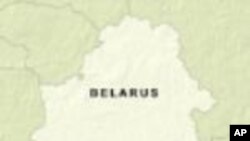A United Nations General Assembly committee has passed, for the second consecutive year, a resolution condemning the human rights situation in Belarus.
During his thirteen years in office, Belarusian leader Alexander Lukashenko has stamped out dissent and strengthened his authoritarian rule through rigged elections, flawed referenda and decrees that undermine the rule of law. The U.N. resolution cites in particular the "severely flawed" presidential election in March 2006 "due to arbitrary use of state power." Throughout the election campaign and in the months afterward, some one thousand opposition and civil society activists were beaten, harassed, fined or imprisoned. Local elections in January 2007 likewise failed to meet international standards.
"As the last dictatorship in Europe," said U.S. Ambassador to the U.N. Zalmay Khalilzad, "[Belarus] continues to imprison people as part of its political strategy." Regrettably, the Belarusian government has not responded to repeated calls by the U.N. or to recommendations by other international bodies to reform its governance and human rights practices. If anything, repression of the political opposition has increased.
The U.N. is urging the government of Belarus "to release immediately and unconditionally all individuals detained for politically motivated reasons and other individuals detained for exercising or promoting human rights."
The resolution also voiced concern over the lack of academic and press freedom in Belarus. Under the current regime, no one can criticize the government publicly without fear of reprisal, and authorities impede criticism of the government by videotaping political meetings, frequent identity checks, and other forms of intimidation. In the last year, no permits have been granted to any new independent newspapers. Meanwhile, authorities closed at least two independent newspapers, continue to threaten others and block access to the internet.
Ambassador Khalilzad said the resolution, which the U.S. sponsored together with thirty-six other countries, sends a strong message that "we don't just hold developing countries accountable but developed countries as well." It is time for the government of Belarus to respect freedom of speech, assembly, and association, and to meet international standards for elections. The government should also suspend officials implicated in cases of forced disappearance, summary execution, and torture.












